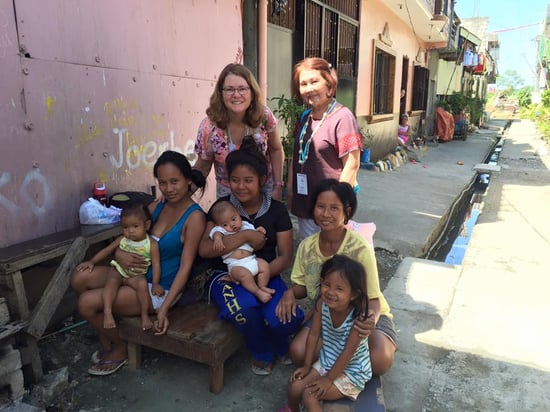Today's gospel passage from Luke 16 challenges us out of our comfort zone and reminds us that caring for the poor among us is a non-negotiable for followers of Christ.
Abraham replied, ‘My child,
remember that you received what was good during your lifetime
while Lazarus likewise received what was bad;
but now he is comforted here, whereas you are tormented.
Moreover, between us and you a great chasm is established
to prevent anyone from crossing
who might wish to go from our side to yours
or from your side to ours.’
So what are we families to do in the midst of life's daily busyness to ensure that we are compassionately loving those most in need? As families, we are uniquely poised to take three simple steps to serve our world:
- Pray together for the poor - In our morning prayer, before mealtimes, as we close the day, or even in spontaneous moments, we can pause and pray for those in need. Praying for the poor can be especially powerful when we encounter them personally. Doing this immediately when we have an interaction with someone in need also lets our children know that we can and do care for those who are poor.
- Give to the poor - As a family, prayerfully discern how you will give of your gifts each month to serve those in need. Whether you choose to financially support your local parish's efforts, Catholic Charities, CRS, Caritas, Unbound or any other of the many worthy charities, make financial giving to a charitable organization a line item on your family's budget.
- Live in solidarity with the poor - Actively choose NOT to consume. When you make a decision to live more simply so that you can share your gifts with others, discuss this choice with your children and let them know WHY you have decided to not purchase something. Look for opportunities to purchase fair trade to provide a livable wage to a producer. Purchase locally grown. Pray about big purchases prior to making them. Understand the economic footprint of your purchases.
Just as the "rich man" in today's gospel learned, we are all called to listen to the teachings of Christ and his Church in loving the poor. In his homily for today (read it here in full) Pope Francis challenges us:
The rich man, then, had the appearance of being religious, but did not know the “peripheries,” he was completely “closed in on himself.” It is precisely the “peripheries” on his very doorstep that he could not see. He took the “way of falsehood,” because he “trusted only in himself, in his things – he did not trust in God.” He was a man who wasn’t able to properly receive his inheritance, or live his life, because “he was closed in on himself.” And, the Pope said, “it is curious – the man had lost his name. It says only that he was a rich man, and when your name is only an adjective, it is because you have lost [something], you have lost substance, you have lost strength."
“This wealth, this is power, this can accomplish anything, this is a priest with a career, a bishop with a career… How many times [do] we [do this]?... It amounts to naming people with adjectives, not with names, because they have no substance. But I ask myself, ‘Did not God, who is a Father, have mercy on this man? Did He not knock on his heart to move him?” But yes, he was at the door, in the person of that man Lazarus, who had a name. And Lazarus, with his needs and his sorrows, his illnesses – it was the Lord Himself who was knocking at the door, so that this man would open his heart and mercy would be able to enter. But no, he did not see, he was simply closed: for him, outside the door there was nothing.”
A question for you: How does today's gospel make you feel about your family's service to the poor?
Copyright 2016 Lisa M. Hendey
About the Author

Lisa M. Hendey
Lisa M. Hendey is the founder of CatholicMom.com, a bestselling author and an international speaker. A frequent radio and television guest, Hendey travels internationally giving workshops on faith, family, and communications. Visit Lisa at LisaHendey.com, on her Substack at LisaHendey.Substack.com, or on social media @LisaHendey for information on her speaking schedule or to invite her to visit your group, parish, school or organization. Find Lisa’s books on her Amazon author page.



.png?width=1806&height=731&name=CatholicMom_hcfm_logo1_pos_871c_2728c%20(002).png)
Comments